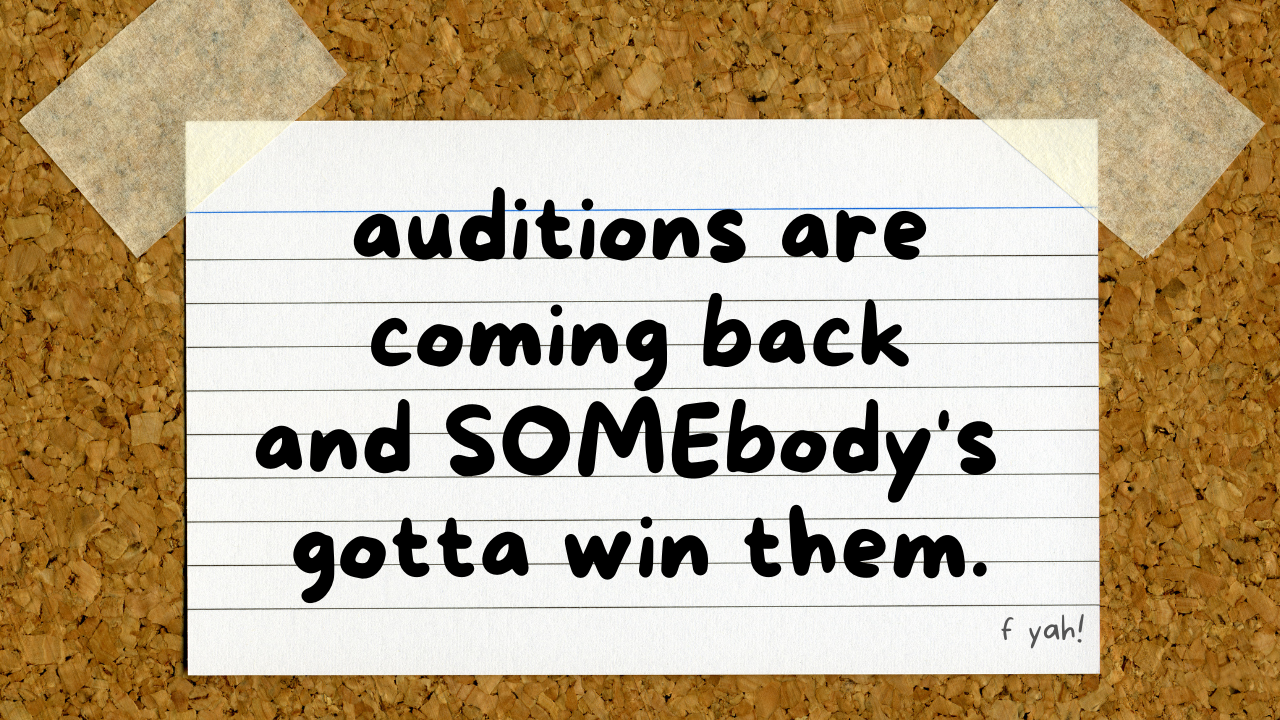remember when leslie knope met her hero, vice president joe biden?
ben wyatt: i kind of got you an engagement present
leslie knope: is it a waffle tower?
ben: i mean, it’s a little better than that. <they walk into the room with vice president joe biden>
leslie: uh…that….how did...how did you do this?
ben: called in a few favors. a few hundred favors. <turns to vice president biden.> excuse me, mr. vice president. ben wyatt from congressman murray’s office.
joe: ben, they told me you were going to be coming by, and you must be leslie knope. welcome!
leslie: hahahaha! you…my…my name just came out of your mouth.
joe: well, yeah it did.
leslie: this isn’t happening. this isn’t real.
joe: no, it’s happening, and i’m delighted to have you here. on behalf of the president and myself, i wanted to...
leslie: oh, mr. vice president, i’m deeply flattered, but there’s no way i could take over madam secretary clinton’s position.
joe: i’m confident you could do that job or any other, but...
leslie: OK i will.
total geekouttery.
that was totally me, circa high school, when i got to play side-by-side with my teacher, detroit symphony orchestra timpanist brian jones. i was a high school student at interlochen arts camp, and the detroit symphony orchestra came to interlochen to play a concert. after their concert, most of the orchestra principals stayed at camp and joined the student orchestra for the week, including our concert. it was amazing. and life changing.
we played berlioz’ roman carnival overture. i was principal, so i assigned the parts. (can you imagine? assigning parts for your own teacher?) in that piece, there’s timpani, bass drum, cymbals, triangle, and tambourine.
this is what's known in the biz as #toomanytambourines
normally i would have assigned myself timpani, but there’s a funny and unusual marking in these parts. the tambourine part actually says, “2 tambourines.” it might be a misprint, but i’m not sure. i think most orchestras ignore it because doubling a tambourine part sounds pretty weird to me. i literally have no idea if orchestras ever double that part, but since my teacher was there, i decided to selfishly assign both me and him to the same part. cue: totally geeking out.
so we played the whole week together, literally playing every note in unison. it’s pretty unusual to double anything in percussion. but i copied every single thing he did. when he flattened the tambourine to stop the jingles, it was a new technique for me, but i copycatted it exactly. when he raised the tambourine to the air, i did too. when he moved from finger to knee/fist and back to finger, you better believe i did too. i spent that time not thinking for myself… at all.
looking for an audition breakthrough?
here's my 5-step guide to constructing your preparation process and optimizing it for maximum results for any instrument.
i copycatted and soaked up a ton of new ideas.
and now all that is a distant memory. do i always flatten my tambourine in the same measure that we did that week? not really. do i always go to the knee/fist technique when doing figures like we did in the berlioz? i really don’t know. i don’t reference that concert anymore when i pick my techniques. that’s because i didn’t create an unflinching rule for myself. rather, i simply learned the techniques by copycatting, testing them out, integrating them into my playing, and then tucking them away for future use. now they're somewhere in my bag of tricks, and i take them out whenever i want.
copycatting helped develop my musical voice.
and now i’m not copycatting. i may have learned the technique from someone, and copycatted for a little while. but eventually, i became the musical filter. i know all the techniques i have to work with, and i get to decide when to use each of them. i’m the boss of my own playing, and i reach into my bag of tricks and pull out techniques whenever i deem them appropriate, based on my own musical voice. of course, if i never had copycatted in the first place, then my bag of tricks would be empty. if i’d never copycatted, i never would have learned those things or figured out how to integrate them myself.
so: you should mimic everyone. always. shamelessly.
you can copycat your teacher, your colleagues, your classmates, or even your students, if you have them. if you’re in school orchestra, you can directly copy what someone else is doing. if you walk by someone’s practice room, and you hear someone using a sticking that you’ve never heard before (or fingering, bowing, or tonguing for you non-percussionists), go ahead and just steal it! this is a part of your education, and you have to be shamelessly unapologetic about it. eventually, one day, no one will remember where you got your techniques. but the more techniques or ideas you tested out through your education, the more you’ll have to work with in a playing situation. as a professional, the more tricks in your bag, the more colors in your palette, the better musician you’ll be.
meet sofia, a shameless cat.
in fact, if you don’t copycat then you’re missing out on a huge, important part of your education. part of the whole reason you’re at school is to be in the middle of a thriving community of great musicians, all competing, coming up with ideas, and figuring out how to get to the next level. you get thrown in the lion’s den with a bunch of other budding musicians, and you all have to try to get out. that’s why you’re there. part of your $40,000 per year (sorry, dudes) is that you can learn from all the different ideas being tossed around your school.
so take advantage of it. copy everything. mimic everyone. let it all seep into your playing. do it now, during your education, so that later it will be a part of you and your musical voice.
what about the fact that you should be creative and find your own ways to do things?
uh…. YEAH. do that too. these are not mutually exclusive - it's in addition to trying to find your own solutions to problems.
so, how do you do it?
say you’re in performance class, and someone plays something in a way that you’ve never heard, but it seems to go over well. you might not know how to apply it today, or to do it successfully. but you should try it and see what happens. try it in different performance situations. try it in your next lesson. work it into your playing in the practice room. play it for other people and see if you can get it to sound good.
but don’t just do it with one thing. it should be a constant lifestyle choice. you should be methodically doing it with anything and everything that you see around you. in fact, the goals here are:
learn as many things as you can. come up with them yourself, learn them from your teacher, copy them from other people, and find them in any other way that’s available.
try all of them. integrate them into your playing. figure out when those techniques are appropriate, and when they’re not. find out all the new ways you can use them to sound different than you ever have sounded before.
use your own musical preferences to decide when to use them. refer to them whenever you want, as much or as little as you need to. forget about where you learned them: it doesn’t matter.
congratulations, you’ve just begun the process of developing your musical voice.
yay!
looking for an audition breakthrough?
here's my 5-step guide to constructing your preparation process and optimizing it for maximum results for any instrument.

















i've worked with hundreds of musicians on audition preparation. and nothing - NOTHING - has been as effective and life-changing as when they start self-recording the right way.